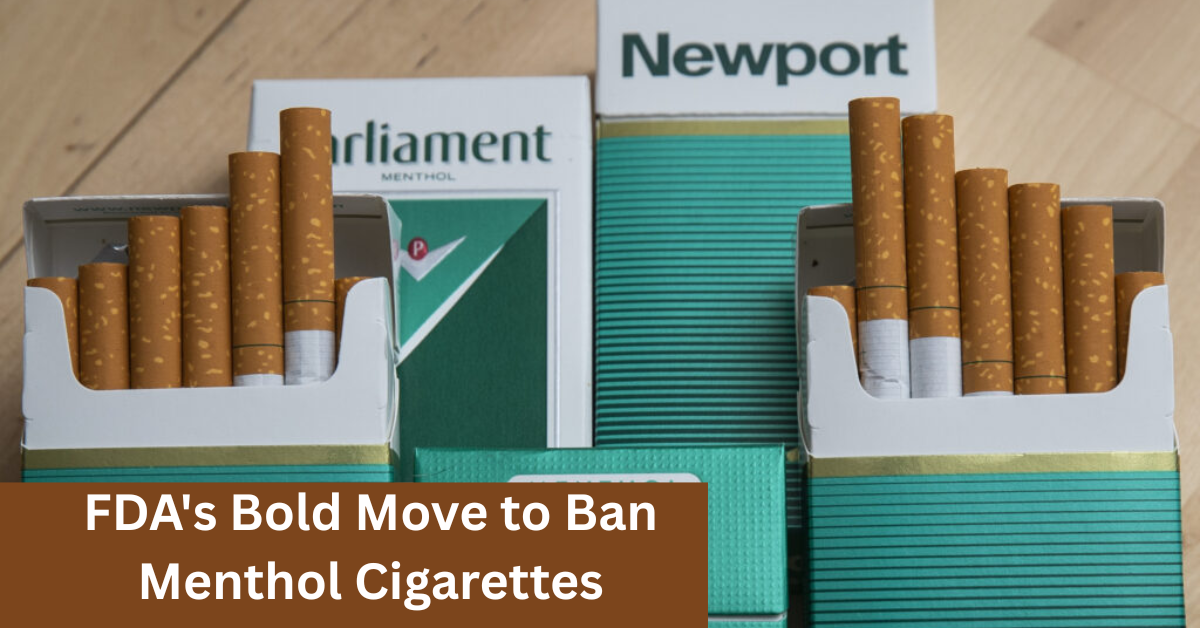The U.S. Food and Drug Administration (FDA) has recently proposed a groundbreaking ban on menthol cigarettes, aiming to curb tobacco-related health issues across the nation. This move targets a specific segment of cigarette users drawn to the cooling and soothing effect menthol provides, which is believed to contribute to higher addiction rates. The proposed policy has already sparked widespread conversations among public health experts, smokers, and policymakers alike.
Menthol cigarettes have long been controversial due to their unique ability to mask the harshness of tobacco smoke, making it easier for users to start and continue smoking. With rising concerns about health disparities and addiction, the FDA’s proposal is seen as a significant step towards reducing tobacco use, especially among young people and marginalized communities. This article explores what the proposed ban entails, the science behind menthol cigarettes, and the impact this policy could have on public health.
Understanding the FDA’s Proposal to Ban Menthol Cigarettes
The FDA’s proposal intends to prohibit the manufacture and sale of menthol-flavored cigarettes in the United States. This initiative is part of the agency’s broader tobacco control strategy to protect public health by reducing smoking initiation and promoting cessation. By targeting menthol cigarettes specifically, the FDA aims to address the appeal of these products among youth and minority populations, who have disproportionately higher usage rates.
Menthol flavoring is known to reduce the irritation associated with smoking regular cigarettes, making it easier for individuals to become addicted. The proposal includes a timeline for implementation, allowing manufacturers to phase out menthol cigarettes while providing support programs for smokers seeking to quit. Enforcement measures would follow the ban, ensuring compliance throughout retail and manufacturing channels.
Why Menthol Cigarettes Are Harmful
Menthol cigarettes pose unique risks compared to non-menthol cigarettes due to their chemical composition and impact on the human body. Menthol’s cooling sensation masks the bitterness of tobacco smoke, which can encourage longer and deeper inhalation. This deeper exposure increases the amount of harmful chemicals absorbed in the lungs and bloodstream, leading to more severe health consequences.
Additionally, menthol’s effects on the nervous system may enhance nicotine’s addictive properties, making it harder for smokers to quit. The tobacco industry’s targeted marketing efforts have also contributed to higher menthol cigarette use among Black communities and young adults. These factors combine to perpetuate health inequalities and increased risks of diseases such as lung cancer, heart disease, and stroke.
Menthol Cigarette Usage Statistics and Demographic Insights
| Demographic Group | Percentage of Smokers Using Menthol Cigarettes | Health Impact |
|---|---|---|
| Black Adults | Over 80% | Higher rates of tobacco-related illnesses |
| Youth and Young Adults | Approximately 40% | Increased likelihood of smoking initiation |
| General Adult Population | About 30% | Elevated risk of nicotine dependence |
These stats underscore how menthol cigarettes disproportionately affect specific groups, reinforcing the need for regulatory action to reduce consumption and improve health outcomes.
Potential Public Health Benefits of the Menthol Cigarette Ban
Implementing a ban on menthol cigarettes could significantly reduce smoking-related illnesses and deaths over time. By removing the appealing minty flavor, the FDA expects fewer youths will start smoking, lowering future addiction rates. This preventative benefit directly translates into reduced healthcare costs and less burden on families affected by tobacco-related diseases.
The ban is also anticipated to boost cessation rates among current menthol smokers. Many who find quitting challenging may now have fewer triggers prompting cigarette use, increasing their chances of successfully quitting. Public health campaigns and support resources will likely accompany this ban to maximize its effectiveness and reach.
Challenges and Controversies Surrounding the Ban
Despite wide-ranging support, the FDA’s proposal has faced criticism and challenges. Some argue that banning menthol cigarettes infringes on personal freedoms and the rights of adult consumers. There are also concerns about potential unintended consequences, such as the emergence of black markets for menthol cigarettes or increased sales of other tobacco products.
Moreover, tobacco companies have opposed the ban, arguing it could harm small businesses and lead to job losses. Enforcement logistics and ensuring compliance among retailers pose additional hurdles. Balancing these challenges while ensuring the ban’s success will require careful planning and ongoing monitoring.
Impact on Communities Disproportionately Affected by Menthol Cigarette Use
Menthol cigarettes have been heavily marketed to minority communities, particularly Black Americans, resulting in higher smoking rates and subsequent health disparities. The proposed ban aims to address these long-standing issues by limiting access to these products. This could promote health equity by reducing the burden of tobacco-related diseases in these populations.
Community organizations and advocacy groups have expressed support for the ban, highlighting its potential to improve quality of life and reduce premature deaths. However, they emphasize the importance of culturally sensitive cessation services and education to support smokers through the transition.
How the Ban Could Influence Youth Smoking Trends
Youth smoking prevention is a primary goal behind banning menthol cigarettes. The enticing flavor has been a gateway for many young individuals to experiment with tobacco products. Removing menthol from the market reduces the products’ appeal and may postpone or prevent initiation.
Studies suggest that flavor bans in cigarettes and e-cigarettes correlate with decreased youth experimentation and ongoing use. By closing this loophole, the FDA hopes to reduce the number of new smokers and the long-term health challenges associated with nicotine addiction.
What Smokers Can Expect If the Ban Is Enacted
For current menthol cigarette smokers, the proposed ban means they will soon need to explore alternative options, including quitting or switching to non-menthol products. The FDA and public health organizations plan to ramp up cessation programs, providing resources like counseling, nicotine replacement therapies, and support groups.
While some may find transitioning difficult, the ban’s aim is to encourage healthier choices and reduce tobacco dependence. Smokers are encouraged to prepare by seeking help early and exploring cessation aids tailored to their needs.
Comparisons to Similar Policies in Other Countries
Several countries have already implemented bans or restrictions on menthol cigarettes, providing insights into potential outcomes. For example, Canada and the European Union have seen reductions in menthol cigarette sales and a boost in quit attempts post-ban. These cases demonstrate that well-enforced flavor bans can be effective public health tools.
However, the U.S. market has unique challenges, and lessons from abroad emphasize the need for strong enforcement, public education, and community involvement to ensure success.
The Role of Education and Community Support in the Ban’s Success
Education campaigns will play a vital role in helping smokers understand the risks of menthol cigarettes and the benefits of quitting. Informing the public about the reasons behind the ban and available resources enhances compliance and reduces resistance.
Community organizations can also provide culturally relevant support and outreach, particularly in underserved populations disproportionately affected by menthol use. Combining regulatory action with education and social support creates a comprehensive approach to tobacco control.
Looking Ahead: The Future of Tobacco Regulation in the U.S.
The proposed menthol cigarette ban signals a broader shift in tobacco regulation aimed at protecting public health and reducing addiction. As the FDA continues to evaluate emerging products like flavored e-cigarettes, future policies may further restrict flavors or marketing tactics that appeal to youth.
This ongoing commitment suggests the U.S. will maintain momentum toward a tobacco-free future, balancing industry regulation with public education and cessation support. Smokers, policymakers, and health advocates alike will play crucial roles in shaping this evolving landscape.
Conclusion: A Defining Moment in Public Health Policy
The FDA’s proposed ban on menthol cigarettes represents a landmark effort to tackle tobacco addiction and health disparities. By restricting the availability of flavored cigarettes known to foster addiction among vulnerable populations, the policy strives to save lives and promote healthier communities.
While challenges ahead remain, the ban offers hope for a reduction in smoking initiation and enhancement of cessation rates. Collaboration between regulators, healthcare providers, and communities will be essential to turn this ambitious proposal into a successful public health victory.




